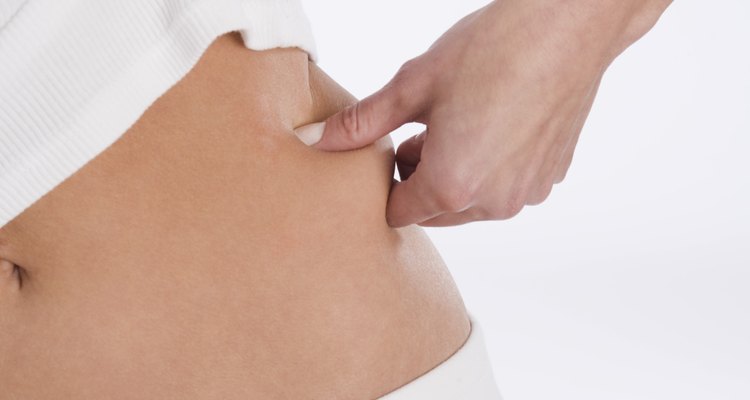
Cellulite is the name given to the dimpled appearance that occurs on the skin of some people. While there are both biological and environmental causes of cellulite, drinking tea is not generally considered one of them. You should speak to a doctor or health care provider if you need medical advice about cellulite or potential treatments.
Cellulite
Cellulite is fat that exists just below the skin. Some people get it around their hips, thighs and buttocks, though it may also appear on the abdomen or other parts of the body. Cellulite can appear in anyone, even thin people, and appears as dimpling or bumps in the skin somewhat similar to the appearance of cottage cheese.
Cellulite Causes
According to the Mayo Clinic, cellulite forms as a result of fat cells in a person's body that are covered by fibrous connective cords. These cords attach your skin to your muscles. Fat can form in between the skin and muscle layers, and when it does it can push up on the skin. The parts of your skin where the connective chords are attached are held down while the unconnected parts are not, causing the dimpling pattern of cellulite.
Tea and Cellulite
Tea leaves come from the Camellia sinensis plant, leaves that contain flavonoids, caffeine and fluoride, according to Oregon State University's Linus Pauling Institute. While drinking a modest amount appears to reduce your risk of having a heart attack, there is no evidence to show that tea causes cellulite. Further, it is unclear if tea or tea extracts aid in weight loss or reduce fat.
Cellulite Treatment
According to Medline Plus, a service of the National Institutes of Health, there is no cure for cellulite. While you may be able to avoid developing cellulite by eating a healthy diet, staying hydrated and exercising regularly, once you have cellulite it is effectively there for life. Neither weight loss, massage, surgery, dietary supplements or other methods have shown to be effective in eliminating cellulite, according to the University of New Mexico.
Cautions
There are any number of products available for dissolving, reducing, eliminating, preventing or otherwise treating cellulite. Some treatments, for example, cite green tea, herbal tea or tea extract as an effective treatment for cellulite. Though the manufacturers make claims about their effectiveness, scientific study provides little evidence to back up these claims.
Related Articles

L-Carnitine for Cellulite
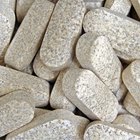
The Best Anti-Cellulite Supplements

Is Rooibos Tea Good for Acne?
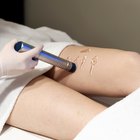
Is Cellulite a Permanent Condition?

Does Tanning Help Cellulite?

Asian Secret to Removing Cellulite

Acupuncture & Cellulite

Pycnogenol and Acne

How to Blanch Tomatillos

Home Remedies for Cellulite With Castor ...

Stages of Underarm Hair
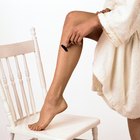
How to Get Rid of Visible Hair Follicles

How to Cure Razor Burn on a Woman's ...

What Foods Provide Calcium D-Glucarate?
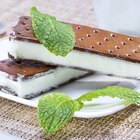
The Calories in an Ice Cream Sandwich
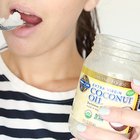
Skin Benefits of Eating Coconut Oil

Galvanic Cellulite Treatment

The Difference Between Retin A & Renova

What Are the Dangers of 6 Oxo?

How to Get Rid of Cellulite & Spider ...
References
- Mayo Clinic.com: Cellulite
- Medline Plus: Cellulite
- YaleGlobal Online: Tea: Still Hot After Five Thousand Years
- Oregon State University, Linus Pauling Institute: Tea
- University of New Mexico; Cellulite: A Review of its Anatomy, Physiology and Treatment; Len Kravitz, Ph.D. and Nicole J. Achenbach, B.S.
Writer Bio
Roger Thorne is an attorney who began freelance writing in 2003. He has written for publications ranging from "MotorHome" magazine to "Cruising World." Thorne specializes in writing for law firms, Web sites, and professionals. He has a Juris Doctor from the University of Kansas.
Photo Credits
Creatas Images/Creatas/Getty Images